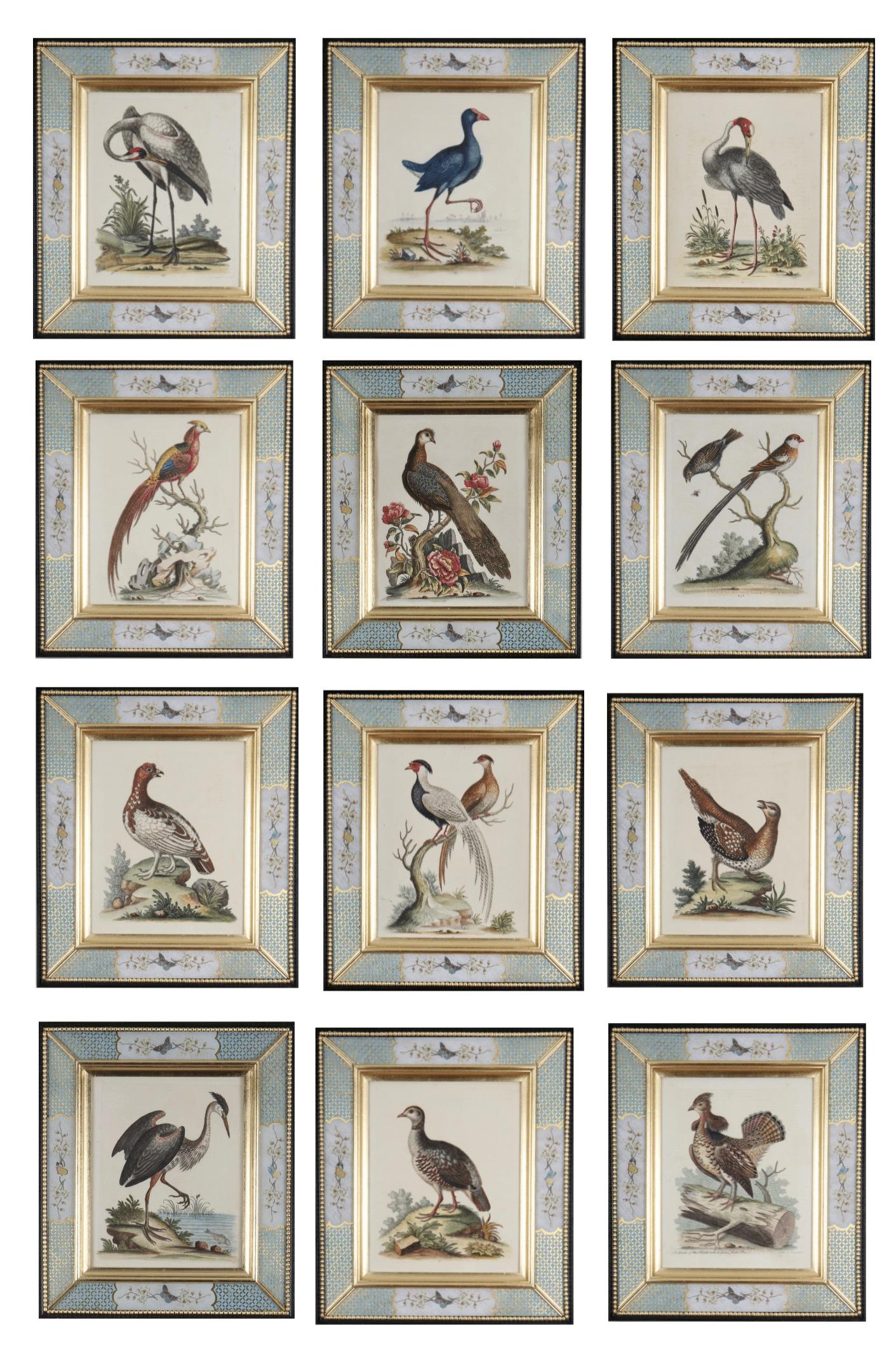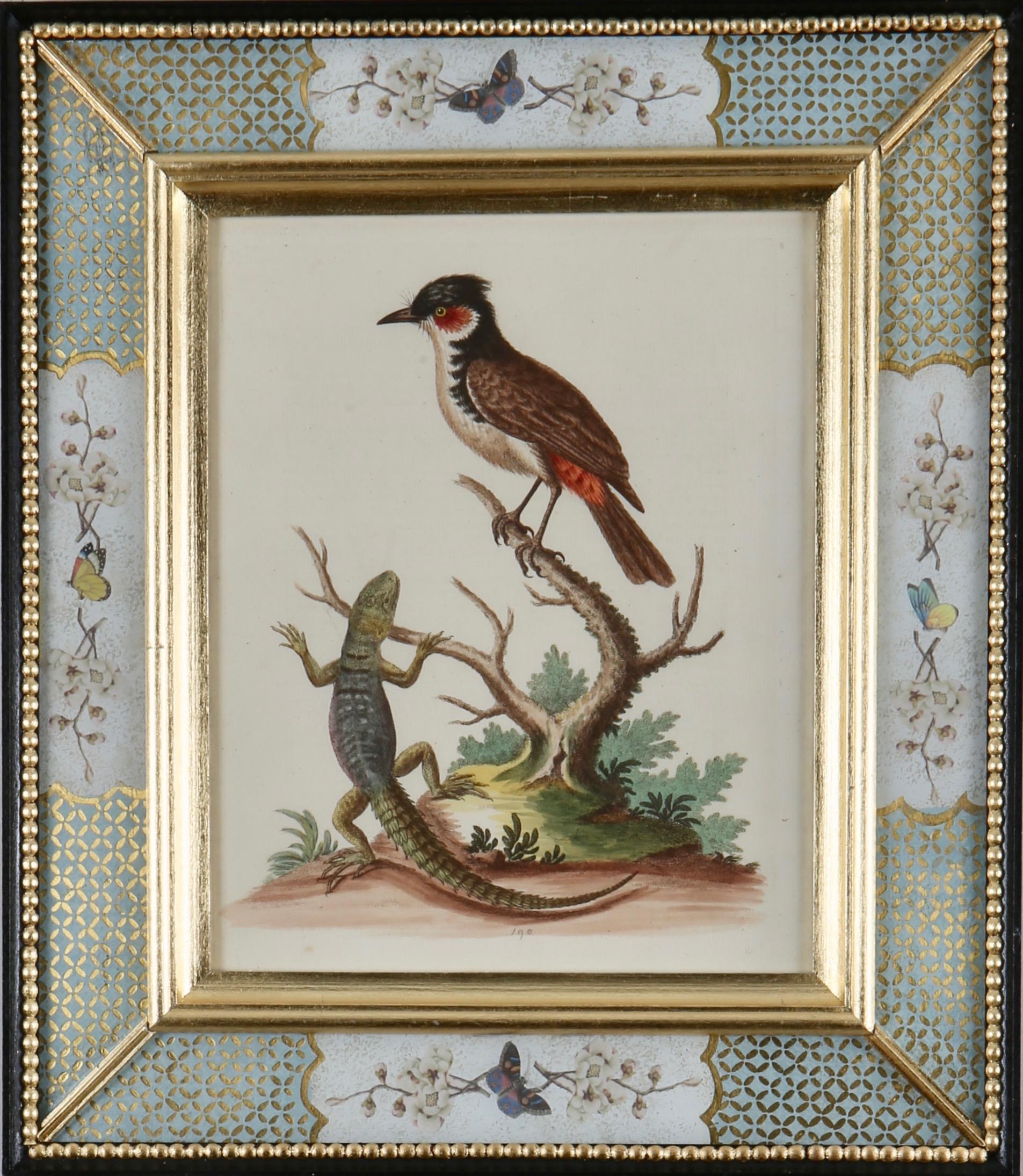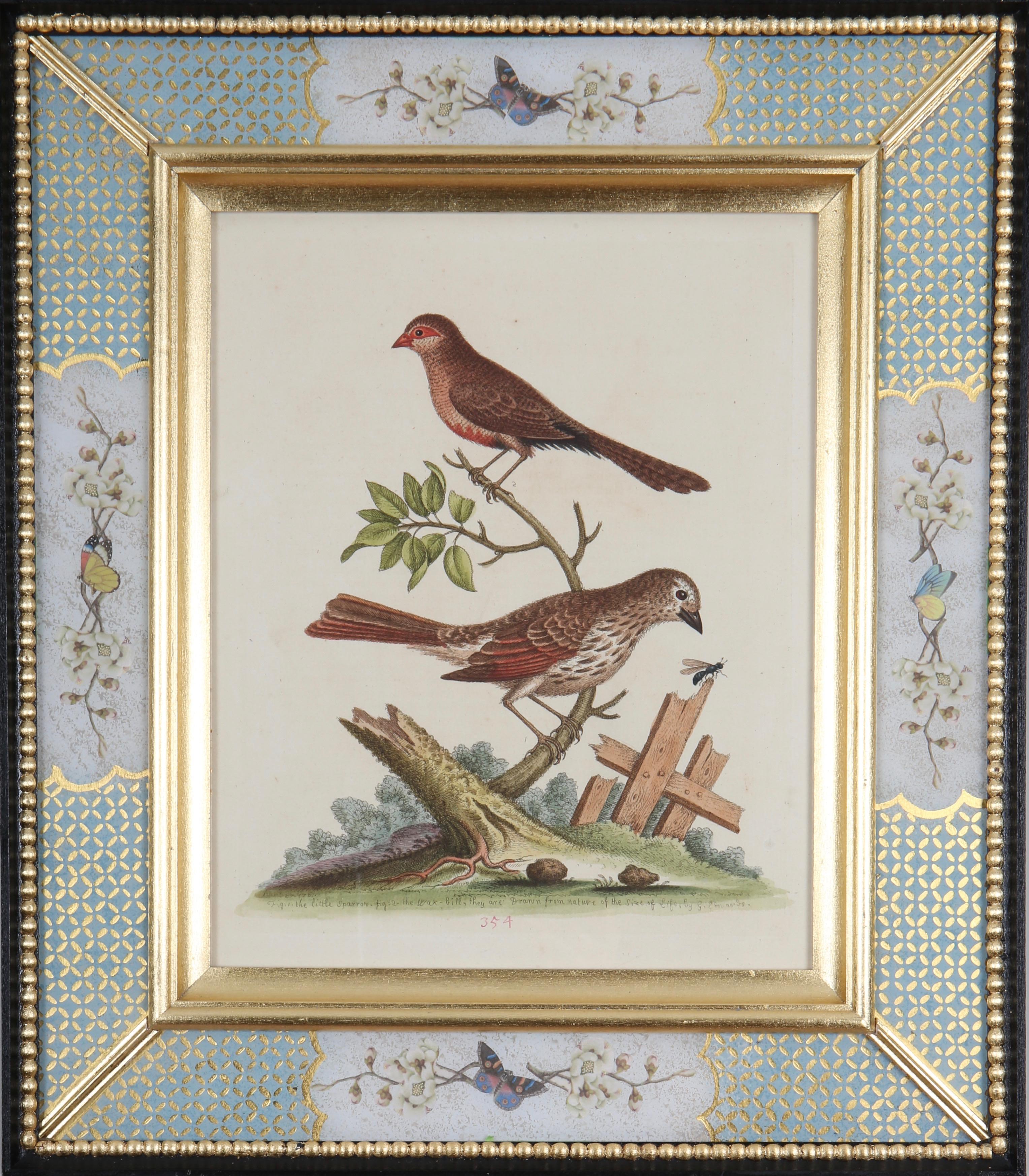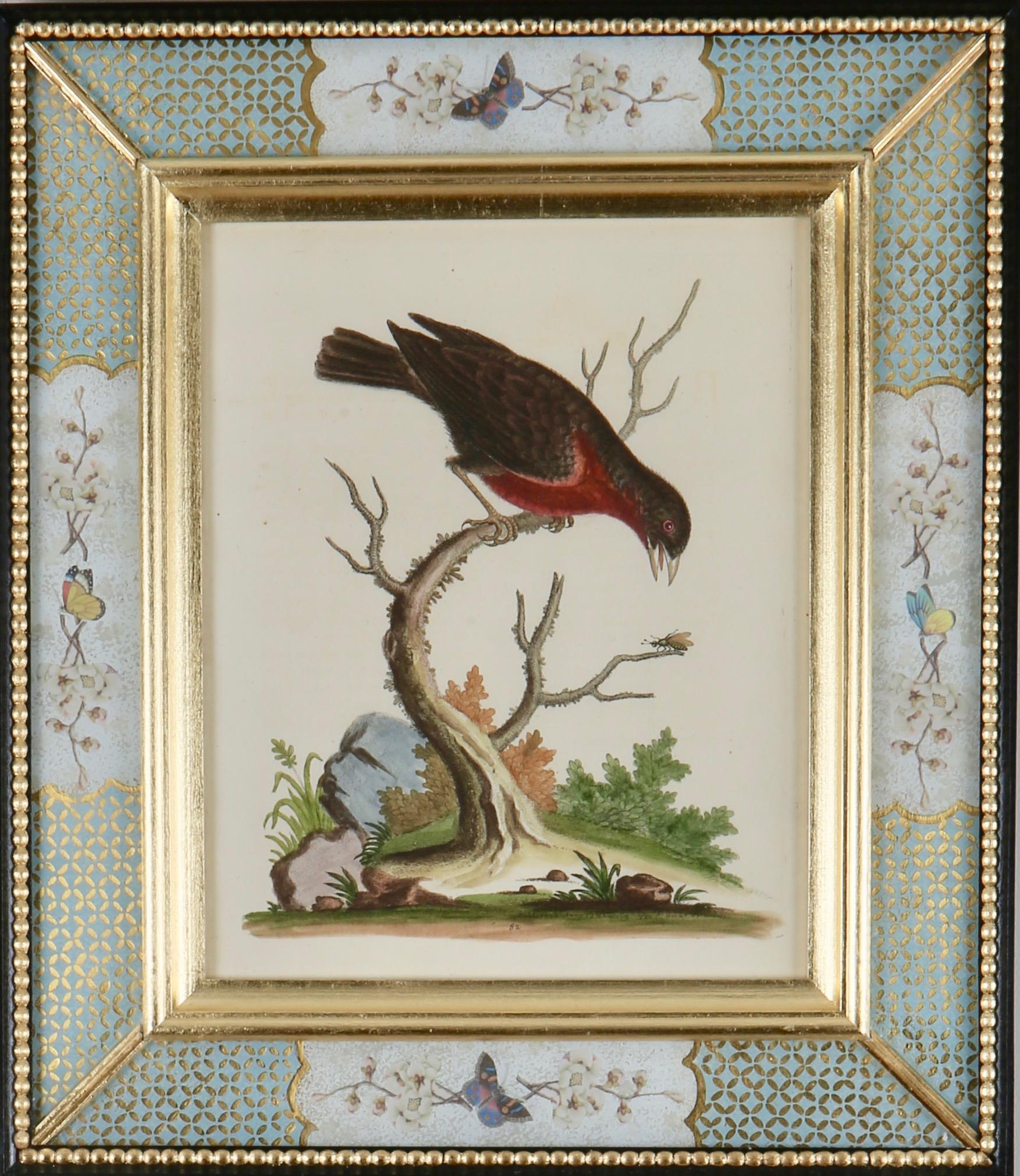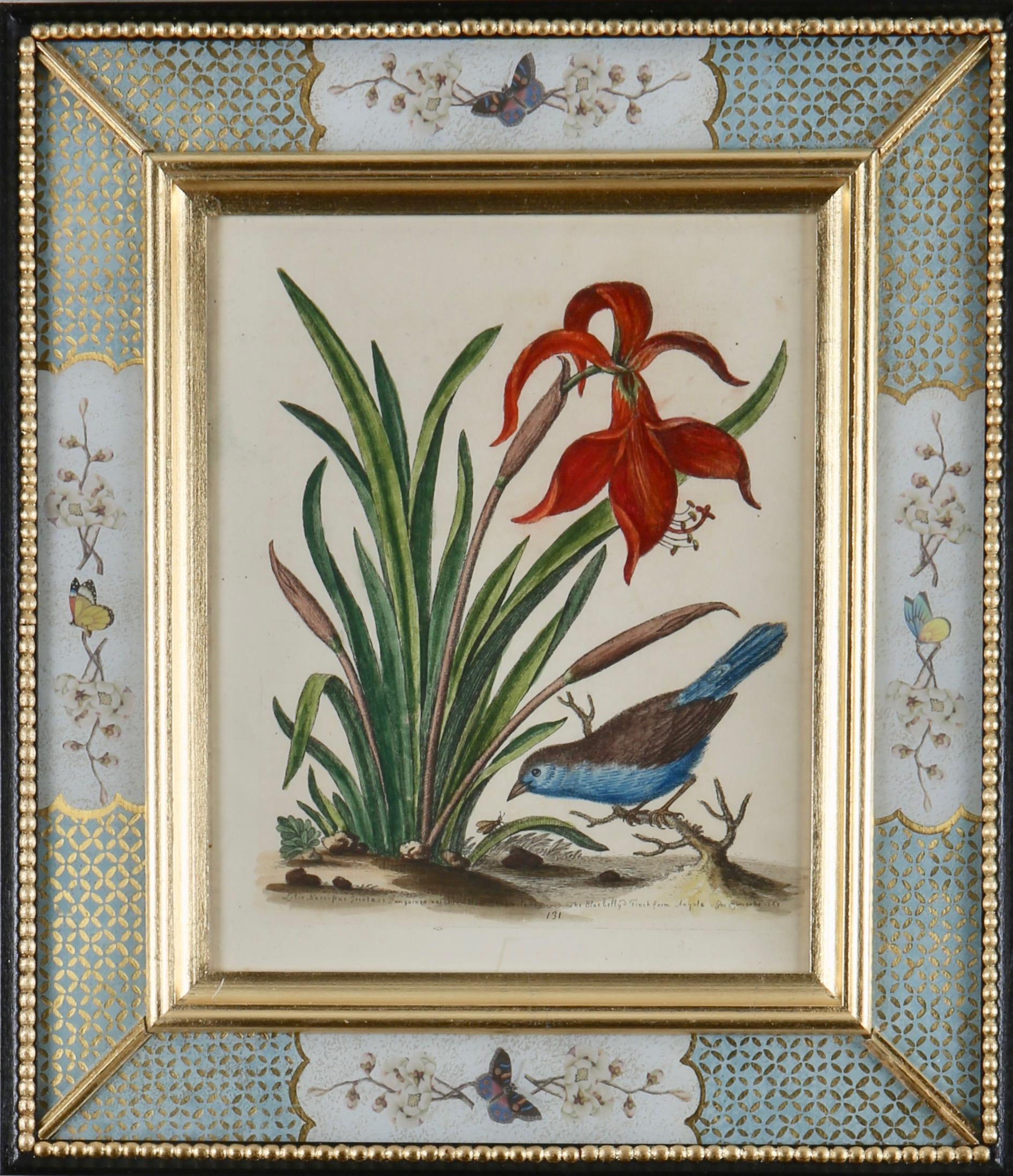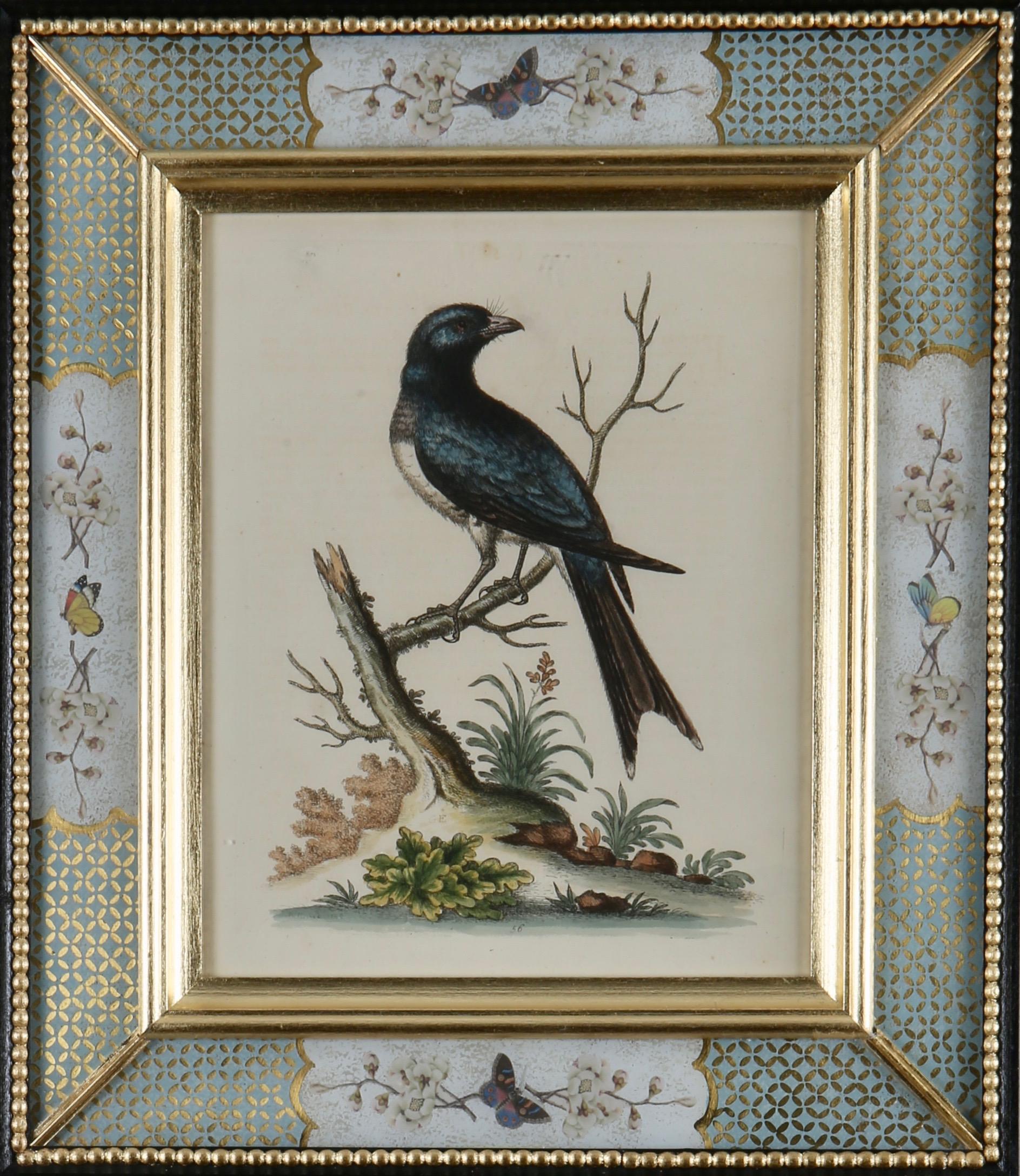George EdwardsGeorge Edwards: 18th Century Engravings of Birds1749-1761
1749-1761
About the Item
- Creator:George Edwards (1694 - 1773, English)
- Creation Year:1749-1761
- Dimensions:Height: 15.75 in (40.01 cm)Width: 13.75 in (34.93 cm)
- Medium:
- Period:
- Condition:
- Gallery Location:Richmond, GB
- Reference Number:
George Edwards
Known today as the Father of British Ornithology, George Edwards was a draftsman and naturalist who popularized the art of bird and animal illustrations throughout the 18th century. His main collections of etchings, which were bound as the volumes A Natural History of Uncommon Birds and Gleaning of Natural History, together comprise more than 600 animals and were the first works to delineate many of the featured species.
Edwards cultivated an interest in natural history while traveling around Europe, becoming particularly enamored with birds. Upon his return to the United Kingdom, in 1733, Irish physicist Hans Sloane, an acquaintance of British naturalists/illustrators Eleazar Albin and Mark Catesby, offered Edwards a librarian position at the Royal College of Physicians. The job granted him access to a large collection of works on natural history, which he explored enthusiastically.
With instruction from Catesby, Edwards learned etching and spent much of his time preparing plates and drawings for his books. While Edwards hand-colored his early editions, later works were colored in by other artists, like British artist Peter Paillou, allowing Edwards to focus on etching and writing.
George Edwards earned his reputation for both his illustrations and written descriptions of his subjects — widely acclaimed for their accuracy. Swedish botanist Carl Linnaeus cited Edwards’s texts when developing his major work, Systema Naturæ. The Royal Society in London awarded Edwards the Copley Medal in 1750 for outstanding achievement in the field of science. Edwards retired in 1763 to Plaistow, England, and died in 1773.
On 1stDibs, find a collection of George Edwards engravings and wall decorations.
- ShippingRetrieving quote...Ships From: Richmond, United Kingdom
- Return PolicyA return for this item may be initiated within 14 days of delivery.
- Set of Twelve 18th Century Engravings of BirdsBy George EdwardsLocated in Richmond, GBGeorge Edwards: ""A History of Uncommon Birds"", 1749-1761. A prominent English naturalist and ornithologist, George Edwards (1694 -1773) is best known for his work, ""A Natural His...Category
18th Century Animal Drawings and Watercolors
MaterialsEngraving, Watercolor
- George Edwards: 18th Century Engravings of BirdsBy George EdwardsLocated in Richmond, GBGeorge Edwards: ""A History of Uncommon Birds"", 1749-1761. A prominent English naturalist and ornithologist, George Edwards (1694 -1773) is best known for his work, ""A Natural His...Category
18th Century Animal Drawings and Watercolors
MaterialsEngraving, Watercolor
- George Edwards: 18th Century Engravings of BirdsBy George EdwardsLocated in Richmond, GBGeorge Edwards: ""A History of Uncommon Birds"", 1749-1761. A prominent English naturalist and ornithologist, George Edwards (1694 -1773) is best known for his work, ""A Natural His...Category
18th Century Animal Drawings and Watercolors
MaterialsEngraving, Watercolor
- George Edwards: 18th Century Engravings of BirdsBy George EdwardsLocated in Richmond, GBGeorge Edwards: ""A History of Uncommon Birds"", 1749-1761. A prominent English naturalist and ornithologist, George Edwards (1694 -1773) is best known for his work, ""A Natural His...Category
18th Century Animal Drawings and Watercolors
MaterialsEngraving, Watercolor
- George Edwards: 18th Century Engravings of BirdsBy George EdwardsLocated in Richmond, GBGeorge Edwards: ""A History of Uncommon Birds"", 1749-1761. A prominent English naturalist and ornithologist, George Edwards (1694 -1773) is best known for his work, ""A Natural His...Category
18th Century Animal Drawings and Watercolors
MaterialsEngraving, Watercolor
- George Edwards: 18th Century Engravings of BirdsBy George EdwardsLocated in Richmond, GBGeorge Edwards: ""A History of Uncommon Birds"", 1749-1761. A prominent English naturalist and ornithologist, George Edwards (1694 -1773) is best known for his work, ""A Natural His...Category
18th Century Animal Drawings and Watercolors
MaterialsEngraving, Watercolor
- Wanted - Original Children Book Illustration Painting For "Frog in Africa"Located in Salzburg, ATOriginal Illustration for published children's book "Frog in Africa" - "Żaba w Afryce" Grazyna Rigall, signet by artist, It is in a plain Ikea frame. Grażyna Rigall is a painter, ...Category
2010s Contemporary Animal Paintings
MaterialsPaper, Watercolor, Pencil
- "Blooming Jaguar", watercolor & pencil illustration on watercolor paperBy Oliver FloresLocated in Dallas, TX"Blooming Jaguar" by Oliver Flores is a whimsical watercolor and charcoal drawing of a beautiful colorful elephant. This artwork comes in a white floater frame, ready to hang. Frame...Category
2010s Contemporary Animal Drawings and Watercolors
MaterialsWatercolor, Archival Paper, Charcoal
- Jouney No. 6 Yellow Rhino, watercolor & charcoal of flying rhinoceros and birdsBy Oliver FloresLocated in Dallas, TX"Jouney No. 6 Yellow Rhino" by OLiver Flores is a whimsical watercolor and charcoal drawing of a flying rhinoceros and flock of birds. This artwork comes with a white floater frame,...Category
2010s Contemporary Animal Drawings and Watercolors
MaterialsWatercolor, Charcoal, Archival Paper
- Jouney No. 5 Yellow Rhino, watercolor & charcoal of flying rhinoceros and birdsBy Oliver FloresLocated in Dallas, TX"Jouney No. 5 Yellow Rhino" by Oliver Flores is a whimsical watercolor and charcoal drawing of a flying rhinoceros and flock of birds. This artwork comes in a white floater frame, r...Category
2010s Contemporary Animal Drawings and Watercolors
MaterialsWatercolor, Charcoal, Archival Paper
- Malcah Zeldis Folk Art Gouache Painting Mod Bull Jewish Woman Outsider ArtistLocated in Surfside, FLMALCAH ZELDIS Bull gouache on paper Hand signed and dated bottom right. titled in pencil on paper verso. Malcah Zeldis (born Mildred Brightman; 1931) is an American folk art painte...Category
1980s Folk Art Animal Paintings
MaterialsPaper, Gouache
- Dame Elisabeth Frink. Hawk, 1969. Watercolor. A Representation of Destruction.By Elisabeth FrinkLocated in Sutton Poyntz, DorsetDame Elisabeth Frink. English ( b.1930 - d.1993 ). Hawk, 1969. Watercolor. Image size 25.4 inches x 19.5 inches ( 64.5cm x 49.5cm ). Frame size 34.4 inches x 28.1 inches ( 87.5cm x 71.5cm ). Available for sale; this original painting is by Dame Elisabeth Frink and is dated 1969. The painting is presented and supplied in a glazed frame and mount dating from June 1997. This vintage watercolor is in very good condition, commensurate with its age. The watercolor is signed and dated lower right. Previously with Beaux Arts, London and Bath in 1999. Dame Elisabeth Frink was one of Britain’s most important post-war sculptors, an accomplished draughtsman, illustrator and teacher. She was part of the post-war school of expressionist British sculptors dubbed the Geometry of Fear, and enjoyed a highly acclaimed career that was commercially successful, broke boundaries and contributed greatly to bringing wonderful sculpture to public places. She was born on 14 November 1930 in Thurlow, the daughter of a cavalry officer, and brought up in rural Suffolk near to an active airbase. She was brought up a Catholic and educated at the Convent of the Holy Family, Exmouth. She then studied at the Guildford School of Art from 1947-1949 under Willi Soukop and Henry Moore’s assistant, Bernard Meadows, and then at the Chelsea School in London 1949-1953. She taught at Chelsea School of Art 1951-61, St. Martin’s School of Art 1954-62 and was a visiting instructor at the Royal College of Art 1965-1967, after which she lived in France until 1973. Frink first came to the attention of the public in 1951 at an exhibition at the Beaux Arts Gallery, London. In 1952 she represented Britain at the Venice Biennale, being described by Herbert Read as “the most vital, the most brilliant and the most promising of the whole Biennale”. The same year the Tate bought its first work by her, and she began to enjoy commercial success. Thereafter she exhibited regularly and was for 27 years associated with Waddington’s, London. The subjects which Frink was most concerned with were man, dog and horses, with and without riders. Interestingly she seldom sculpted the female form, drawing on archetypes of masculine strength, struggle and aggression. Her work has the recurring themes of the vulnerable and the predatory, in the spirit of an authentic post-war artist. It has been said that she was more concerned with representing mankind that portraits of individuals. The appeal of her work lies in its directness, provoking a frank statement of feeling. The anatomy is often exaggerated or incorrect; the impact growing more out of her interest in the spirit of the subject. Her animals and birds may be drawn from nature but verge on the abstract, conveying raw emotion and character rather than a realistic depiction. Her unique style is characterised by a rough treatment of the surface which embeds each piece with vitality and her personal impression. In her later work even the distinction between human and bird figures becomes blurred. Commentators have noted that the often rugged, brutal and contorted surfaces of her work reflect the destruction and terror of the six-year world-wide conflict that she witnessed as a child. Frink was an active supporter of Amnesty International. In the 1960s and early 1970s Frink produced a notable series of falling figures and winged men. Later, living in France during the Algerian war, she began making heads, blinded by goggles which had a threatening facelessness. Frink produced many notable public commissions, including Wild Boar for Harlow New Town, Blind Beggar and Dog for Bethnal Green, Noble Horse and Rider for Piccadilly, London, a lectern for Coventry Cathedral, Shepherd for Paternoster Square beside St. Paul’s Cathedral and a Walking Madonna for Salisbury Cathedral. In the early 1980s she produced a set of three larger than life figures The Dorset Martyrs which stand on the edge of the old walled town of Dorchester on the site of the old gallows, as a memorial to those who had been executed there ‘for conscience sake’. Frink’s Canterbury Tales was a collection of 19 etchings drawn directly on to copper plates and etched by her. The ‘book’ was issued in three limited editions. Her illustrations have been praised as “amongst the most successful illustrations of the century, encompassing the mood of the text in concise delineations and disarmingly ribald humour”. She illustrated other books with colored lithographs or drawings. Frink was on the Board of Trustees, British Museum from 1976, and was a member of the Royal Fine Art Commission 1976-81. CBR (1969), DBE ((1982), Associate of the Royal Academy (1971), Royal Academy (1977). She was made a Companion of Honour in 1992. She died on 18 April 1993, but not before completing her last commission, a monumental but unusual figure of Christ for the front of the Anglican Cathedral in Liverpool, unveiled a week before her death. For several decades Frink exhibited widely in the UK and abroad. In her later years she lived and worked in Dorset where her home and garden became an arena for her work. In 1985 she had a retrospective at the Royal Academy. She died on 18 April 1993, but not before completing her last commission, a monumental but unusual figure of Christ for the front of the Anglican Cathedral in Liverpool, unveiled a week before her death. There was a memorial show at Yorkshire Sculpture Park, Bretton Hall in 1994. Today Frink is venerated as one of the great twentieth century British sculptors. Her unique work is represented in the Tate Gallery and major public and private collections world-wide. © Big Sky Fine Art This original watercolor on paper painting of a hawk by Dame Elizabeth Frink...Category
Mid-20th Century Modern Animal Paintings
MaterialsPaper, Watercolor
